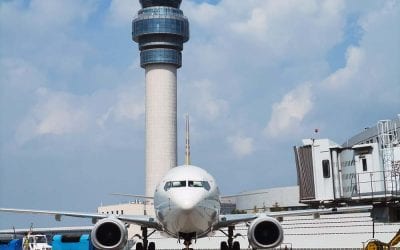Airlines have a love-hate relationship with travel agents. Agents sell over half of the airline tickets in the U.S., and carriers push agents, especially those with large agencies and consortiums, to promote their flights. On the other hand, airlines scramble to have travelers book on their own airline websites. Whether they like it or not, airlines need travel agents.
As an American Airlines executive said some years ago, when travelers go to a travel agency (either online or brick-and-mortar agents), they get offered a choice. This means airlines must offer competitive fares, which can cut into airline profit margins. If everyone booked direct with their preferred airline, there would be no need for price matching.
With all the staff cutbacks airlines have, both in reservations and at the airport, travel agents have become free labor when customers have problems with their flights, whether it be a schedule change or delay. Plus, travel agents can get customers re-booked on other flights faster than the airline often can itself. We have all heard, “Your call will be answered in one hour and twenty-seven minutes. We appreciate your business.”
Often, it’s not any better at the airport when the customer service line winds around the terminal. This can and does happen. Even with the advent of so-called automatic re-booking kiosks and online booking sites, some reservations are either too complicated or don’t have readily apparent fixes.
Now, United Airlines has just updated its rules for travel agents to help passengers when flights are delayed or canceled. Shockingly, the changes are consumer friendly. Now, with the extreme cancellations and delays under a DOT and congressional microscope, other airlines will be taking a closer look at how they manage making changes to itineraries in the case of irregular operations.
Here are highlights of the new United Airlines rules.
- United will be more generous on allowing a travel agent to re-book a client into a higher coach fare. The different letters that airlines use for booking flights — K,S,W,T,L,H,U,M,B, etc., that make no sense to the average traveler — refer to different ticket prices within the same cabin on the plane. Basically, travel agents now have the ability to shift passengers into a higher fare category if necessary when rebooking.
- The airline will also allow agents to change airports for the client, within a 100-mile radius. If a new schedule doesn’t work at all from a smaller airport — for example, San Jose or Providence — agents can re-book clients to or from San Francisco to Boston. This change could also be very helpful for travelers in the New York or Washington, D.C. areas, where there are multiple airports.
- Agents will also be able to move the ticket within a 7-day range of the original flight.
- Other airline schedule changes are included. While this is more rare, agents will be able to change a United flight if another airline on the same ticket changes ITS schedule, which can cause nightmares with connections.
- A 30-minute-or-more advance schedule change or 1-hour delay will allow agents to make these changes. Most importantly, when travelers are on a tight schedule, a short amount of time might be the difference in making or being able to stay for an important event or meeting. The old rule mandated changes were only allowed after a two-hour delay.
These changes don’t mean travel agents won’t still have some times when they need to call United — changing to another airline, for example — plus, the ticket reissue process isn’t instant, since it will still require waiver codes and some internal work. But, for many travelers, it’s likely to be a lot faster than trying to do it themselves. And, even though travel agents have special phone numbers, it’s always nice to eliminate time spent on hold.
Travel agents will need to decide, individually, if they want to charge travelers for the additional work. United will not be paying them to do these ticket changes. But, the new rules may be another reason travelers might consider paying an agency fee for a “simple airline ticket.”
Janice Hough is a California-based travel agent a travel blogger and a part-time comedy writer. A frequent flier herself, she’s been doing battle with airlines, hotels, and other travel companies for over three decades. Besides writing for Travelers United, Janice has a humor blog at Leftcoastsportsbabe.com (Warning, the political and sports humor therein does not represent the views of anyone but herself.)


